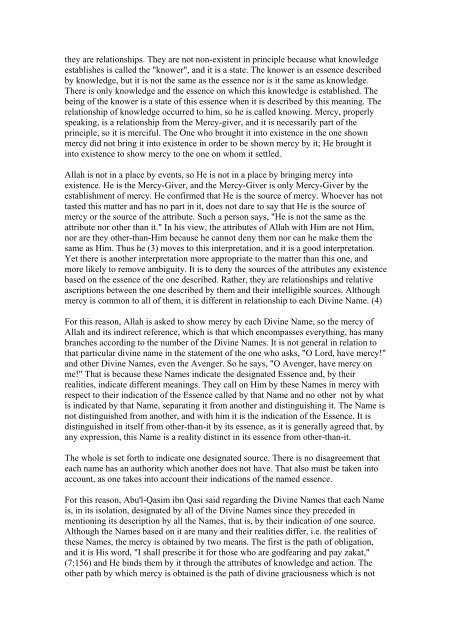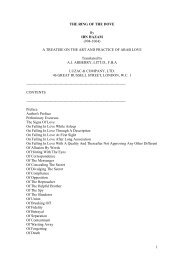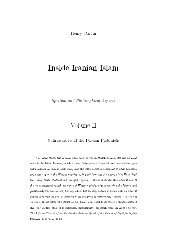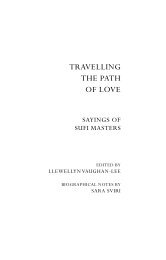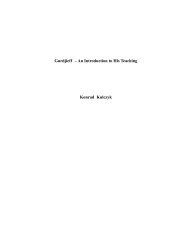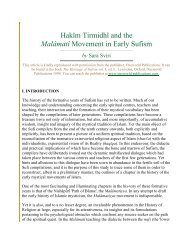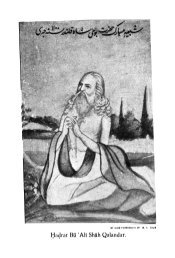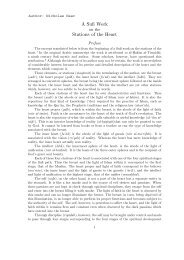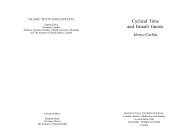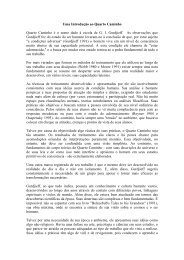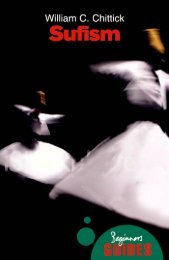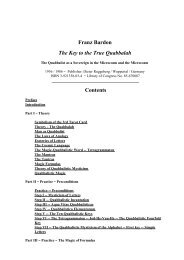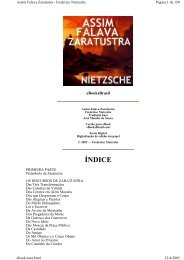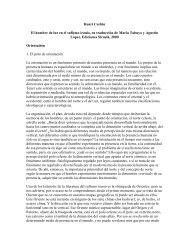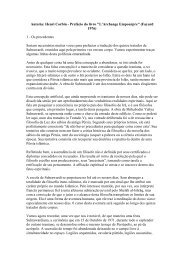Fusus al-Hikam The Seals of Wisdom by Shaykh al ... - ImagoMundi
Fusus al-Hikam The Seals of Wisdom by Shaykh al ... - ImagoMundi
Fusus al-Hikam The Seals of Wisdom by Shaykh al ... - ImagoMundi
Create successful ePaper yourself
Turn your PDF publications into a flip-book with our unique Google optimized e-Paper software.
they are relationships. <strong>The</strong>y are not non-existent in principle because what knowledge<br />
establishes is c<strong>al</strong>led the "knower", and it is a state. <strong>The</strong> knower is an essence described<br />
<strong>by</strong> knowledge, but it is not the same as the essence nor is it the same as knowledge.<br />
<strong>The</strong>re is only knowledge and the essence on which this knowledge is established. <strong>The</strong><br />
being <strong>of</strong> the knower is a state <strong>of</strong> this essence when it is described <strong>by</strong> this meaning. <strong>The</strong><br />
relationship <strong>of</strong> knowledge occurred to him, so he is c<strong>al</strong>led knowing. Mercy, properly<br />
speaking, is a relationship from the Mercy-giver, and it is necessarily part <strong>of</strong> the<br />
principle, so it is merciful. <strong>The</strong> One who brought it into existence in the one shown<br />
mercy did not bring it into existence in order to be shown mercy <strong>by</strong> it; He brought it<br />
into existence to show mercy to the one on whom it settled.<br />
Allah is not in a place <strong>by</strong> events, so He is not in a place <strong>by</strong> bringing mercy into<br />
existence. He is the Mercy-Giver, and the Mercy-Giver is only Mercy-Giver <strong>by</strong> the<br />
establishment <strong>of</strong> mercy. He confirmed that He is the source <strong>of</strong> mercy. Whoever has not<br />
tasted this matter and has no part in it, does not dare to say that He is the source <strong>of</strong><br />
mercy or the source <strong>of</strong> the attribute. Such a person says, "He is not the same as the<br />
attribute nor other than it." In his view, the attributes <strong>of</strong> Allah with Him are not Him,<br />
nor are they other-than-Him because he cannot deny them nor can he make them the<br />
same as Him. Thus he (3) moves to this interpretation, and it is a good interpretation.<br />
Yet there is another interpretation more appropriate to the matter than this one, and<br />
more likely to remove ambiguity. It is to deny the sources <strong>of</strong> the attributes any existence<br />
based on the essence <strong>of</strong> the one described. Rather, they are relationships and relative<br />
ascriptions between the one described <strong>by</strong> them and their intelligible sources. Although<br />
mercy is common to <strong>al</strong>l <strong>of</strong> them, it is different in relationship to each Divine Name. (4)<br />
For this reason, Allah is asked to show mercy <strong>by</strong> each Divine Name, so the mercy <strong>of</strong><br />
Allah and its indirect reference, which is that which encompasses everything, has many<br />
branches according to the number <strong>of</strong> the Divine Names. It is not gener<strong>al</strong> in relation to<br />
that particular divine name in the statement <strong>of</strong> the one who asks, "O Lord, have mercy!"<br />
and other Divine Names, even the Avenger. So he says, "O Avenger, have mercy on<br />
me!" That is because these Names indicate the designated Essence and, <strong>by</strong> their<br />
re<strong>al</strong>ities, indicate different meanings. <strong>The</strong>y c<strong>al</strong>l on Him <strong>by</strong> these Names in mercy with<br />
respect to their indication <strong>of</strong> the Essence c<strong>al</strong>led <strong>by</strong> that Name and no other not <strong>by</strong> what<br />
is indicated <strong>by</strong> that Name, separating it from another and distinguishing it. <strong>The</strong> Name is<br />
not distinguished from another, and with him it is the indication <strong>of</strong> the Essence. It is<br />
distinguished in itself from other-than-it <strong>by</strong> its essence, as it is gener<strong>al</strong>ly agreed that, <strong>by</strong><br />
any expression, this Name is a re<strong>al</strong>ity distinct in its essence from other-than-it.<br />
<strong>The</strong> whole is set forth to indicate one designated source. <strong>The</strong>re is no disagreement that<br />
each name has an authority which another does not have. That <strong>al</strong>so must be taken into<br />
account, as one takes into account their indications <strong>of</strong> the named essence.<br />
For this reason, Abu'l-Qasim ibn Qasi said regarding the Divine Names that each Name<br />
is, in its isolation, designated <strong>by</strong> <strong>al</strong>l <strong>of</strong> the Divine Names since they preceded in<br />
mentioning its description <strong>by</strong> <strong>al</strong>l the Names, that is, <strong>by</strong> their indication <strong>of</strong> one source.<br />
Although the Names based on it are many and their re<strong>al</strong>ities differ, i.e. the re<strong>al</strong>ities <strong>of</strong><br />
these Names, the mercy is obtained <strong>by</strong> two means. <strong>The</strong> first is the path <strong>of</strong> obligation,<br />
and it is His word, "I sh<strong>al</strong>l prescribe it for those who are godfearing and pay zakat,"<br />
(7:156) and He binds them <strong>by</strong> it through the attributes <strong>of</strong> knowledge and action. <strong>The</strong><br />
other path <strong>by</strong> which mercy is obtained is the path <strong>of</strong> divine graciousness which is not


